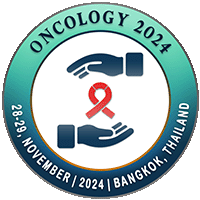.jpg)
Yoko Takeda
Yamagata University, JapanTitle: Relationship between Characteristics of Health-Related Quality of Life and Nutritional Indicators and Eating-Related Distress in Pancreatic Cancer Patients Undergoing Chemotherapy
Abstract
Background. The age-adjusted incidence rate of pancreatic cancer in Japan is estimated to be 14.6%, which is approximately 1.5 times higher than in Western countries. 44.4% of patients with pancreatic cancer are diagnosed with Stage IV disease and are at risk of significant weight loss, cancer cachexia and sarcopenia. Pancreatic cancer patients suffer from eating-related distress. This is due to a lack of understanding of cancer cachexia, as well as the perception of weight loss as a sign of death and fear of failure. It is assumed that eating-related distress affects the health-related quality of life (HRQOL) of pancreatic cancer patients. Therefore, we considered that an approach to resolve eating-related distress in pancreatic cancer patients is an important issue. This study reports on an examination of the association between the characteristics of HRQOL and nutritional indicators and eating-related distress in pancreatic cancer patients undergoing chemotherapy. We hope that the results of our study will provide a basis for considering approaches to the management of low nutritional status and eating-related distress in patients with pancreatic cancer and contribute to improving their HRQOL.
Methods. Thirty-three consenting pancreatic cancer patients undergoing chemotherapy were studied. The primary endpoint of HRQOL was the Functional Assessment of Cancer Therapy-Hepatobiliary (FACT-Hep). Secondary endpoints were nutritional indicators and eating-related distress. Analysis was based on mean FACT-Hep values, which were classified into high and low groups, and intergroup comparisons were made for associations with other variables.
Results. The mean FACT-Hep was 117.1. No statistically significant differences were found between FACT-Hep and nutritional indicators. 57.6% of the subjected pancreatic cancer patients had eating-related distress in that they struggled to cope. The subjected pancreatic cancer patients with a low FACT-Hep group had significantly higher eating-related distress, among which the patient-family relationship was suggested to have an influence on HRQOL.
Biography
Yoko Takeda has completed her PHD at the Yamagata University, Japan. She is the Associate Professor of nursing department of Yamagata University, Japan. She has been involved in nursing education and nursing research for 20 years, based on 20 years of nursing practice with cancer and cardiac patients in Japan. She has dissertations on the quality of life of patients with implantable ICDs and pancreatic cancer patients.

